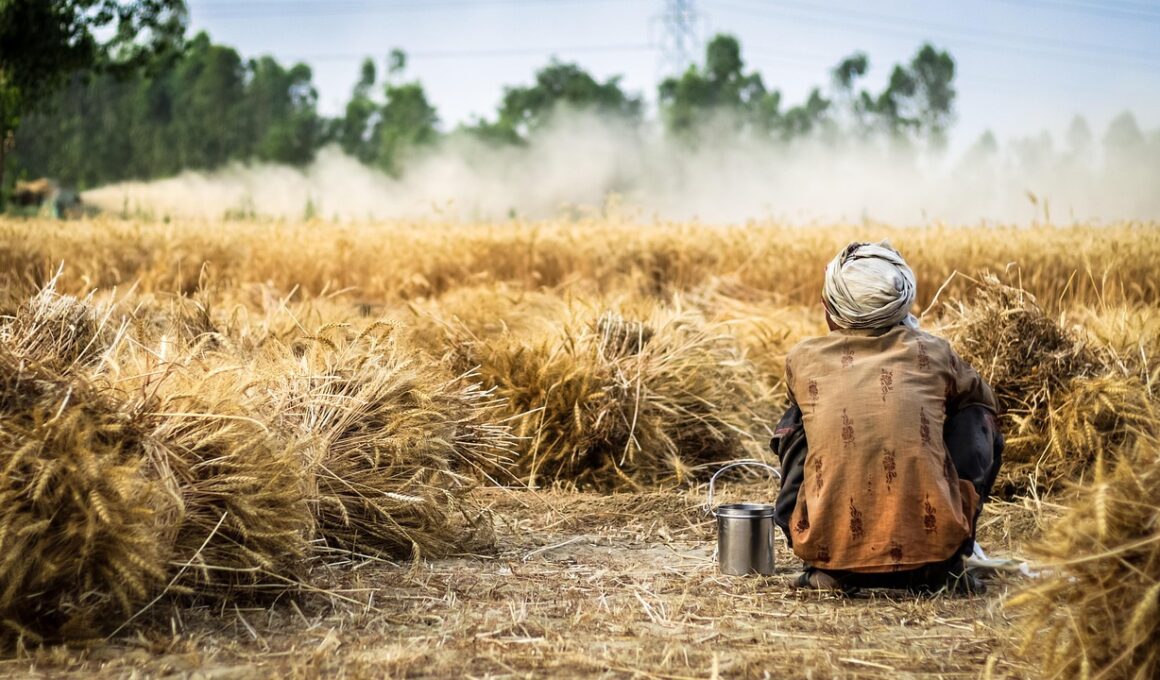Top Tax Deductions Available for Farmers and Agricultural Enterprises
Tax planning is essential for farmers and agricultural businesses aiming to maximize profits and minimize expenses. One of the key areas for potential savings is understanding various tax deductions available to these enterprises. Taking advantage of these deductions can significantly impact a farmer’s overall financial health. By exploring all available options, farmers can ensure they benefit from the latest tax regulations and provisions. Not only can these deductions help offset operating costs, but they also contribute to better investment planning for future growth. Numerous expenses qualify for deduction, including the cost of supplies, machinery, and various operational costs incurred during the farming process. It is advisable for farmers to maintain accurate records of all purchases and expenses throughout the year, as this will simplify the tax preparation process. This careful documentation helps ensure that no eligible deductions are overlooked, leading to significant savings when filing tax returns. Furthermore, seeking professional advice can be beneficial in ensuring compliance with changing tax laws and maximizing available deductions.
One prominent tax deduction available to agricultural businesses is the Section 179 deduction. This provision allows farmers to deduct the full cost of qualifying equipment and software purchased or financed during the tax year. This is particularly advantageous as it enables immediate deduction rather than spreading it across several years through depreciation. Equipment such as tractors, combine harvesters, and other machinery can often be significant expenses for agricultural businesses. In addition, agricultural operations can also benefit from the Modified Accelerated Cost Recovery System (MACRS) for depreciation, which allows a faster deduction for certain types of property. This approach can reduce taxable income sooner, providing valuable cash flow benefits. Farmers should consider which assets to add to their operation and how to maximize income through this type of financial strategy. Another important deduction involves the costs related to soil and water conservation practices aimed at improving farming operations. This can include expenses for building structures, creating water retention features, and implementing soil health improvements.
Deductible Expenses in Agricultural Operations
Another important category involves the deduction of expenses for maintaining and operating a farm vehicle. Costs related to gasoline, repairs, and maintenance on vehicles used explicitly for business activities can be deducted. Documenting mileage and the purpose of every trip is critical to support these deductions. Farmers should also keep records of insurance expenses on these vehicles and machinery as well, since those costs are often deductible. Moreover, costs related to hiring labor and specialized workforce involve substantial expenditures. It is possible for farmers to deduct wages paid to employees, alongside related payroll taxes and benefits such as health insurance. Therefore, managing payroll and labor efficiently can create opportunities for increased savings, which can significantly help operations in the long run. Farmers should not overlook expenses linked to continuing education and professional development. These costs for attending workshops or classes aimed at improving farm productivity or compliance with regulations may also qualify for deductions.
Deductions for feed, livestock supplies, and other farming materials also provide crucial financial relief. These direct costs are needed for sustaining agricultural productivity. Items like fertilizer, seeds, feed, and other inputs should be accurately recorded and filed during tax season. Proper categorization of these expenses ensures maximum deductions while remaining compliant with tax laws. Additionally, farmers should consider the impact of special deductions associated with irrigation expenses. These costs involve the capital needed for installation and maintenance of irrigation systems, which can have a transformative effect on productivity. Staying informed of the latest legislation may offer even more opportunities for specific deductions in conservation practices aimed at sustainable water usage. Tax credits associated with alternative energy sources, such as solar or wind energy systems, might also provide valuable savings. Implementing renewable energy systems not only serves to lower long-term operational costs but can also offer tax advantages.
Using CPAs and Tax Professionals
It is crucial for agricultural businesses to employ Certified Public Accountants (CPAs) or tax professionals who specialize in agricultural tax planning. Their expertise can guide farmers to uncover options that may otherwise go unnoticed. Navigating the world of taxes can be complex, especially with constantly changing regulations, so expert advice can be invaluable. These professionals often provide insights into new tax laws which can lead to more extensive deductions or credits. Moreover, a CPA can assist farmers in establishing the best accounting methods, not just for federal tax purposes but also for state and local taxes, which could also present unique advantages. Farmers can also benefit from their insights into retirement plans and business structures, which could affect tax liabilities in significant ways. This strategic planning can lead to substantial savings on taxable income over time. Opting for professional assistance is often considered a smart investment that pays dividends through enhanced understanding and effective tax strategies.
Farmers may also be eligible for special tax credits aimed specifically at promoting sustainable farming practices. Various federal and state programs exist that support the adoption of environmentally friendly practices. Some of these programs might offer cash incentives or tax reductions, encouraging farmers to engage in conservation efforts or capitalize on renewable resources. Recognizing potential tax credits, farmers can not only improve their profitability but also contribute positively to the environment. Programs focused on developing technology, improving resource efficiency, or conserving natural habitats might qualify for such credits as well. Some businesses even find opportunities to lower their tax burdens by incentivizing education initiatives for farmers seeking innovative methods. This not only supports their business but cultivates values beneficial to the entire agricultural community. Project proposals that achieve sustainability objectives may also be inclined to receive tax credits, further enhancing the financial landscape surrounding environmentally responsible farming.
Conclusion
Effective tax planning is vital for agricultural business owners striving to optimize their financial situation. By taking advantage of the numerous deductions available, they can significantly reduce their tax liabilities, directly influencing overall profitability and growth potential. Keeping detailed records and consulting with tax professionals can empower farmers to make informed decisions regarding their operations. Staying informed on tax legislation alterations and possible deductions, tax credits, and incentives is essential for every agricultural enterprise. Dedicating time to learn about available opportunities through research or direct consultation can prove beneficial in the long run. In addition, sharing knowledge and experiences with fellow farmers may reveal more unrecognized opportunities. Ultimately, sound tax planning can enhance the resilience of agricultural businesses, allowing them to navigate challenges with greater ease while ensuring continued productivity and sustainability. Farmers can create a structure that supports increased operational efficiency and focuses on long-term earnings by applying these tax strategies and remaining attentive to changes in tax laws.


